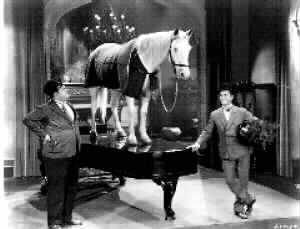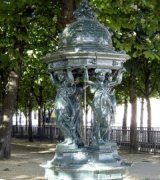Paris Customs
A Little French Etiquette
Some Do's and Don'ts

- Customs in Greetings
- Customs in Restaurants
- Customs on the Metro
- Customs on the Streets
- Things to Look For and Look Out For
- Pick-Pockets and Scams
We’ve all heard stories of unfriendly waiters and the stuffy Parisians.
Well, a lot of what we've heard may be attributed to a difference in customs.
Parisians tend to be a very polite people. It may all be a matter of getting used to Paris Customs.
It all begins with the basics like "please", "s’il vous plait" (seel-voo-play) and "thank you", "merci" (mair-see).
It's surprising how often tourists just don't use these words.
And, not to forget, "pardon" (pahr-dohn). This word is a cure-all.
Paris Customs in Greetings
When walking into a shop, café or restaurant it is one of the Paris Customs to greet the shopkeeper, bartender or receptionist with a "good day" or "good evening"; “bonjour"(bohn-jhur) or "bonsoir" (bohn-swah) "Monsieur or Madame”, (muh-syur, or muh-dam). When leaving it's “Merci, au-revoir” (ohr-ev-wah).
Paris customs dictate that the one entering the establishment makes the greeting, so make the effort to initiate the greeting. If not, it's like when an actor forgets his line. There's an awkward silence and then: nothing.
Use "Monsieur" and "Madame" often, including when speaking to service people. It's another of the Paris Customs and it really does make a favorable impression.
One of the more obvious of Paris Customs is, of course, speaking French. Learning and using a few phrases can open doors and broaden your French experience. The Parisians will know that French is not your first language but they will appreciate your making the effort.
This course can be purchased as a download, is easy to use and an excellent value.
One of the more recent of Paris customs is speaking English. You will have no troubles being understood speaking English, from your hotel to the roving street markets. Still, it's fun speaking another language. Where-else are you going to be able to say bon-jour to someone and not have them think you're a snob?
Paris Customs in Restaurants
- Always wait to be seated.
- Enter by saying bon jour or bon soir and indicate how many people are in your party.
- If you want to make a bad impression, just call the waiter Garçon.Garçon means “boy” and who wouldn’t be put off by that? So, no matter what you've seen in the old movies, it is no longer one of the Paris Customs.
- When you are ready to order, close the menu.
- Servers will not introduce themselves to you by name.
- They will not interrupt your meal by visiting your table and asking, "How is everything? Is there anything you need?"
- To get a waiter’s attention, saying S’il vous plait to them is what works. Or, from a distance, make eye-contact and lift your hand.
- The only time the server will come to your table unasked is at the end of your meal to clear away the plates. You will then be asked if you would like coffee or a dessert.
- The bill won't be brought until you ask for it. Say "L'addition, s'il vous plait", (lah-dee-see-ohn...) to your server. Or, from a distance, scribble with your finger into the open palm of your other hand.
- The only time the bill will be presented with your order is if you are seated outside.
- Tipping: this is always a question for visitors. Paris Customs accept that the service is included in the bill. That may be true technically, but, waiters have told us that it doesn't always come back to them. To let your server know that you have appreciated the service, leave something. 5% of the bill will do it.
- As of January 2008, smoking is no longer permitted inside restaurants, cafés or bars.
Paris Customs on the Metro
- Many Metro stations have this neon sign atop a ten-foot pole at the entrance on the sidewalk. They are fairly easy to spot from a distance.
- The Metro trains can get crowded, very crowded. It seems that Parisians don't mind standing shoulder-to-shoulder or belly-to-back, just don't step on their shoes.
- You will hear and use Pardon on the Metro more than anywhere else. Using "pardon" is the most common of Paris Customs.
- When boarding a Metro car, take off the day-pack. You will take up less space and keep it safer from pick-pockets.
- When walking through the tunnels, keep to the right as much as possible, especially around corners. These tunnels get crowded and people move quickly through them. Keeping to the right, as in traffic, reduces collisions.
- When taking an escalator, stand to the right. This allows others to pass on the left.
- When leaving a Metro station, you will always get a Merci if you hold the door open for the person behind you. These doors can be very heavy.

Paris Customs on the Streets
- Traffic lights, for most Parisian pedestrians, are merely suggestions. Be aware of this while waiting for a light to turn green. We’ve seen many a tourist absently follow a Parisian who may dash across at a break in the traffic. In this case, don't go with the flow.
- Look both ways. One-way streets with two lanes or more often have bus and taxi lanes going in the opposite direction.
- Sidewalk cafés are as typically Parisian as the Eiffel Tower. The trouble is, they are on the sidewalk. Give the waiters the table-side of the sidewalk.
- Keep one eye on the sidewalk. Too many dog owners have yet to train their dog to do its business in the street and not on the sidewalk.
- Sidewalks are narrow in Paris. Parisians don't seem to notice. Don't be offended if you get bumped by somebody with big shoulders.
Things to Look For and Look Out For
- Throughout the city are water fountains called Wallace Fountains, as they were a gift from the British philanthropist Sir Richard Wallace.Designed by Charles Auguste LeBourg, they are made of cast iron and are a deep emerald green color, adorned by statues of four muses representing Goodness, Temperance, Charity and Simplicity. Originally, in 1872, fifty were made. Many more have been added since.
There are other fountains, without the muses, which have the height and look of a green fire hydrant. Both styles only have spigots, so it is best if you have your own bottle to fill.
- As of 2006, the public toilet booths on the street are free to use, no fees. These booths are quite a piece of work. After every use, it goes through a cleaning cycle.
- In the brasseries, the toilets are generally found downstairs. These, however, can present a small challenge for those who have never negotiated a toilet du turque. There's no seat.
- Restrooms in the cafés and brasseries are intended for the customers, not the general public. Exceptions can be made in children's cases. If possible, though, purchase something at the bar.
- The joke, "If you don't like my driving, keep off the sidewalk", takes on a very real meaning in Paris. You'll find the curb-sides are lined with steel posts at about hip-height. These are not meant to be obstacles for tourists, but to keep cars from being parked on the sidewalks. Parisians tend to park their cars anywhere, including on the sidewalk if not for these posts.
- Motorcycles, however, are not restricted by these posts and they do park on the sidewalks, which means driving on the sidewalk. So, watch out for parked and moving motorcycles.
- Generally, where cars are parked on the street, there will be a green parking meter post along the sidewalk. These all have digital clocks on them so you can always know what time it is.
- Doors of shops often open right onto the sidewalk and people can walk out of these shops without noticing somebody walking past. Watch out for them and forgive them. You may find yourself doing the very same thing.
- At almost every sidewalk entrance to a Metro station will be a city map of the main streets and the Metro lines.
- Bus stops have a route map for that bus inside the bus stop booth or on the pole designating the bus stop. On the outside of the bus stop booth will usually be a city map showing all the bus routes.
- On many street corners in the more touristed areas are brown street-signs indicating the direction to a museum or monument in the neighborhood.
- A recent development in keeping the city clean are free-standing, green metal hoops holding green plastic trash bags. They are everywhere, so it won't be too many steps before you find one.

Pick-pockets and Scams
- Pick-pockets are out there, especially when crowds are moving on and off the Metro trains. Keep your important papers separate and inaccessible. Zip up the day-pack. Do not become distracted by groups of children who may crowd around you.
- Amazingly, the streets of Paris seem to be covered with lost gold rings. This has become the most common scam in Paris. While walking, someone may bend down and appear to find a gold ring. They will then try and sell it to you. It's not a gold ring, it's a scam.
- This is the next most common scam. On the Champs Elysées, in front of the Notre Dame or at the Place de la Concorde entrance of the Tuileries Garden, a girl or a woman wearing a long skirt will ask you, "Excuse me, do you speak English?". It is a natural response to say, "Yes", hoping to be friendly and helpful. You will then be shown a piece of paper which asks for money.
- When approaching the funicular or the Square Willette below the Sacre Coeur, there are men who will approach you, grab your hand and attempt to wrap a piece of string around your wrist and charge you for it. Unless you want a 5 euros piece of string, avoid them. These guys can be fairly aggressive.
That said, one 15 year-old client of ours was rather pleased with his piece of string...
- While walking down the street, you may be asked for directions by somebody driving a car. The driver may also be needing gas money to get back to Italy. His story will be that he has just come from a designer show, his reason for being in Paris, and is over-stocked with "designer leather jackets". He will offer to sell you one of these to help him make gas money. These are fake-leather, fake-designer jackets and it's a rip-off scam.
- There are those who will ask you to sign a petition, often it's to fight AIDS. Then, assuming that if you care enough to sign a petition you should donate some money, which goes in their pocket.
However, there are legitimate volunteers also asking for signatures and donations. They are distinguished by badges and/or t-shirts designating their charity.
- Often there are beggars at the door-steps of churches. One guy was sitting there with a brand new portable DVD player that I wish I had. Bad form on his part.
There are also those who are actually in need. They tend to rely on the locals, not the tourists. You'll see the difference.
Our intent here was to warn you of tactics used by professional scammers.
As tourists, we are targets. Be alert, not afraid.
Keep the above warnings in mind and you should have no troubles.
Return to Top of Paris Customs
Return to Paris Walking Tours Homepage
Private Tours
| Paris Introduction Tour | Paris Islands Tour | Paris Passages Tour |
| Trocodero-Eiffel-Invalides | Marais Tour | Montmartre Tour |
| Latin Quarter Tour | Paris Markets Tour | Paris Churches Tour |
Booking.com
New! Comments
Have your say about what you just read! Leave me a comment in the box below.